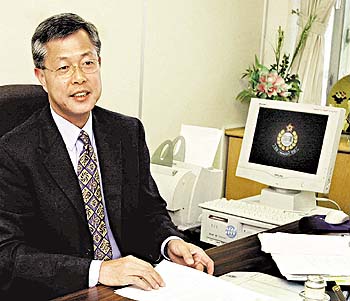Promotion prospects rise further
| Better weather ahead: DCP MAN Dick Lee forecasts a rise in SGT and SSGT posts this year |
"From the start we took the challenge of EPP positively - we have kept the impact on our frontline policing to a minimum and I am confident the Force can deliver its savings comfortably at the end of the exercise, yet remain one of the most effective and efficient police forces in the world"
A forecast boost in Sergeant and Station Sergeant posts this year is expected to return promotion opportunities for these ranks close to pre-Enhanced Productivity Programme levels.
Estimates of 170 SGT and 60 SSGT promotion vacancies for 2001 have been upgraded to about 220 and 80 respectively, close to the average number of promotions in the years prior to EPP.
Extra Government funding garnered during EPP Year Two created opportunities for 33 new SGT posts to conduct school liaison work, identified as an area of public concern in numerous studies.
The expected boost in posts is the latest in a series of benefits garnered through EPP, a programme many sectors initially raised concern over.
However, it has led to the deletion of posts no longer needed, which freed manpower to expand and bolster services in other areas, such as the all-important frontlines.
Deputy Commissioner (Management) Dick Lee Ming-kwai said a plan was now being established under proposals for EPP Year Three that could capitalise on post savings made through the success of the Voluntary Retirement Scheme.
Mr Lee and the Commissioner recently held a meeting with the Senior Directorate to consider proposals for EPP's third and final year, which commences April 1, 2002.
"We are confident we can achieve both our EPP savings target and obtain fresh allocations from the Government for our policing priorities," Mr Lee said.
"The ability to contract out more cleaning and towing services than we originally expected means we can meet our EPP commitment without reducing our public service standards.
"Whilst there will be some deletions of disciplined posts, these will largely be at recruitment ranks with the bulk of the savings again coming from non-operational reserves provided for training purposes.
"This will enable us to substantially maintain the number of promotions at all ranks at pre-EPP levels."
The Chief Executive announced in his 1998 Policy address that under EPP, all Government departments had to cut five per cent of their recurrent expenditure over the three financial years 2000 to 2003, so the savings could be re-allocated to higher priority spending areas.
However, Mr Lee said concerns EPP would affect the number of frontline officers were quickly proved futile.
"From the start we took the challenge of EPP positively," he said.
"Having completed Year One of the exercise and confirmed the plans for Year Two, the Force will soon finalise its proposals for Year Three.
"We have kept the impact on our frontline policing to a minimum, and I am confident the Force can deliver its savings comfortably at the end of this three-year exercise, yet remain one of the most effective and efficient police forces in the world," Mr Lee said.
Amongst other savings, EPP Year One saw 77 disciplined posts deleted with the creation of five new civilian posts. This was done by civilianisation of cooks in Border District and by reducing officers engaged in training duties. None of the posts deleted were engaged in frontline operational duties.
"For Year Two, our original plans entailed the deletion of 435 disciplined posts and 98 civilian posts. However, partly due to the success of the Voluntary Retirement Scheme and after full discussion with the formations concerned, we were able to modify our plans so that only 388 disciplined posts would be deleted with the civilian total rising slightly to 120," Mr Lee said.
"Of the deleted disciplined posts, more than half were reserved posts provided to accommodate new recruits undergoing PTS training. However, in view of the reduction in recruitment in recent years, we will still have sufficient posts available to accommodate our projected intake of recruits.
"It was clear from the outset that most of the savings would have to come from the salaries bill and that we would have to do this through more effective use of existing resources which would not result in a deterioration of our services to the public or an unacceptable drop in officers' career prospects.
"We have always borne these principles in mind and adopted a flexible approach so we could modify plans when better opportunities presented themselves."
<< Back to Index >>
